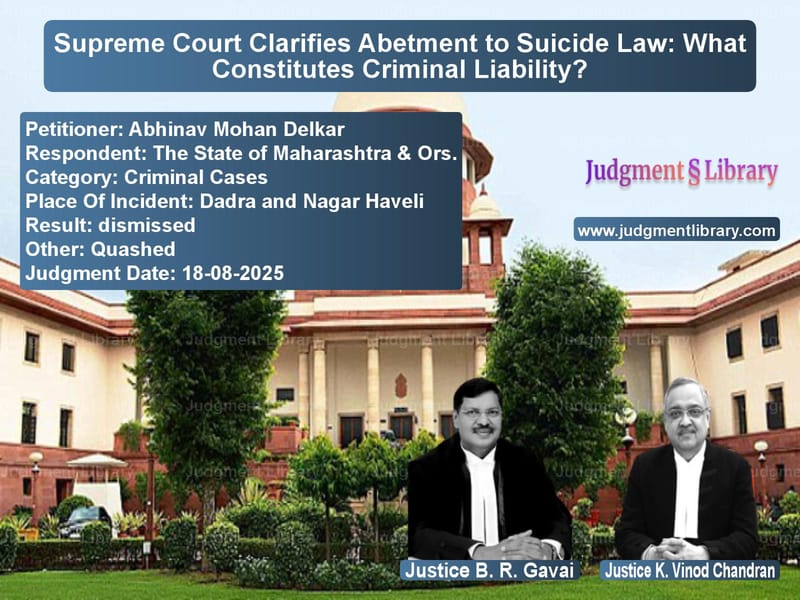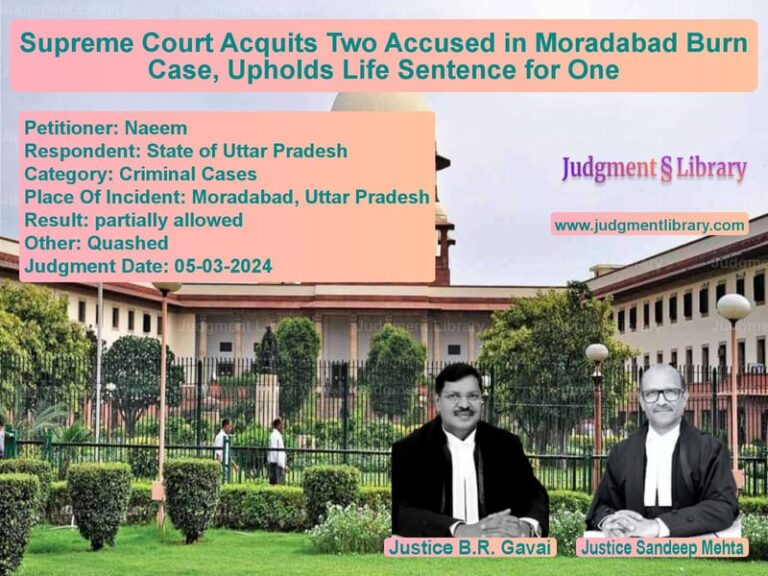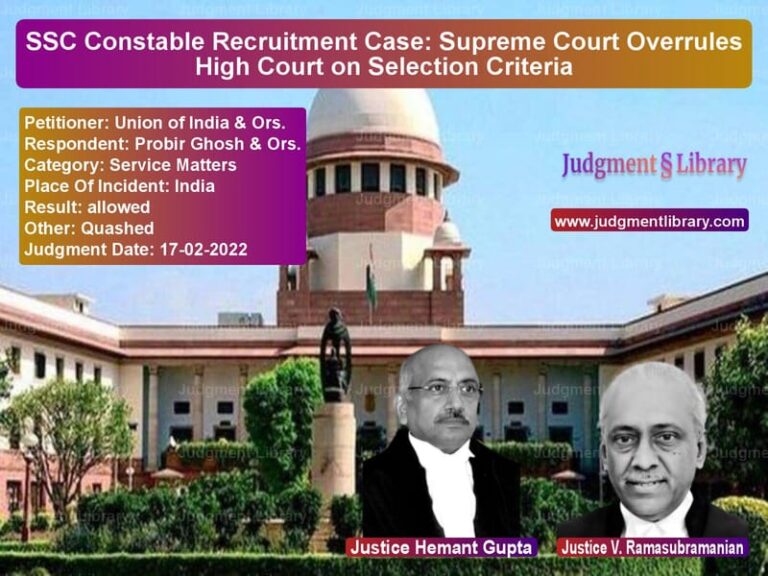Supreme Court Clarifies Abetment to Suicide Law: What Constitutes Criminal Liability?
The Supreme Court of India recently delivered a landmark judgment that delves deep into the complex legal question of what constitutes abetment to suicide under Section 306 of the Indian Penal Code. The case involved the tragic suicide of a seven-time Member of Parliament and the subsequent criminal proceedings against various administrative officials and a private individual named in his suicide note. The court’s detailed analysis provides crucial clarity on when continuous harassment or humiliation can translate into criminal liability for abetment to suicide, and when it cannot.
The case originated from the suicide of the Parliamentarian on February 22, 2021, who left behind a suicide note naming several persons in the administration and police whom he accused of conspiring to defame, degrade, and demean him to end his political career and social standing. The accused persons had successfully approached the High Court to quash the FIR registered against them, and the Supreme Court was now hearing appeals against that quashing.
The Legal Battle: Arguments from Both Sides
Ms. Meenakshi Arora, learned Senior Counsel appearing for the appellant, presented a compelling case before the court. She took the court through the minutes of the Committee of Privileges in the Lok Sabha which had been investigating complaints raised by the deceased about breach of parliamentary privileges. She argued that the accused were named by the deceased before the Committee, and from various statements, it was clear that a concerted effort was underway to diminish his public image and finish off his political life.
Ms. Arora pointed out that the statements of witnesses clearly indicated attempts of extortion and forceful takeover of a college owned and managed by a Trust formed by the deceased. She argued that a conspiracy was hatched to tarnish his political image, particularly because he had won as an independent candidate without any political affiliation to the Lok Sabha seven times. Answering the query regarding absence of a live link with the alleged harassment, she pointed out that the deceased was a man of public standing and the continuous humiliation he suffered at the hands of the administration, pursued unabated despite his raising it before the Committee of Privileges, eventually led to the drastic step.
The Division Bench of the High Court failed to look into the suicide note or the material on record which surely warrants a trial and definitely not a quashing as has been done under Section 482, Cr.PC, she contended.
On the other side, Shri Tushar Mehta, learned Senior Counsel appearing for the respondent State, rested content with the statement of law emerging from various precedents. He pointed out that the allegations, on the face of it, arose from oversensitivity. Shri Mahesh Jethmalani, learned Senior Counsel appearing for one of the accused, the Administrator, argued that there was no complaint of extortion before the Parliamentary Committee and it was for the first time raised in the suicide note. The witnesses were all associates of the deceased who had merely paid lip service to the suicide note.
He pointed out that even as per the FIR, the deceased had written a letter to the Administrator, less than a month before his death, seeking his help which clearly indicated that the allegation of conspiracy levelled against the Administrator was without any basis. The accusation of extortion was one made for the first time in the suicide note and was never complained of anywhere including the Privileges Committee.
The Court’s Legal Analysis
The Supreme Court embarked on a comprehensive analysis of the legal principles governing abetment to suicide. The court began by examining the essential ingredients of Section 306 read with Section 107 of the IPC, noting that despite a wealth of precedents, police still have not come to terms with what constitutes abetment as envisaged under these provisions.
The court meticulously examined numerous precedents on the subject and distilled the essential principles. It observed: “What comes out essentially from the various decisions herein before cited is that, even if there is allegation of constant harassment, continued over a long period; to bring in the ingredients of Section 306 read with Section 107, still there has to be a proximate prior act to clearly find that the suicide was the direct consequence of such continuous harassment, the last proximate incident having finally driven the subject to the extreme act of taking one’s life. Figuratively, ‘the straw that broke the camel’s back’; that final event, in a series, that occasioned a larger, sudden impact resulting in the unpredictable act of suicide.”
The court emphasized that what drove the victim to that extreme act often depends on individual predilections, but whether it is goaded, definitively and demonstrably, by a particular act of another, is the test to find mens rea. Merely because the victim was continuously harassed and at one point succumbed to the extreme act of taking his life cannot by itself result in finding a positive instigation constituting abetment.
The court made a crucial distinction: “The victim may have felt that there was no alternative or option, but to take his life, because of what another person did or said; which cannot lead to a finding of mens rea and resultant abetment on that other person. What constitutes mens rea is the intention and purpose of the alleged perpetrator as discernible from the conscious acts or words and the attendant circumstances, which in all probability could lead to such an end.”
The court further elaborated: “The real intention of the accused and whether he intended by his action to at least possibly drive the victim to suicide, is the sure test. Did the thought of goading the victim to suicide occur in the mind of the accused or whether it can be inferred from the facts and circumstances arising in the case, as the true test of mens rea would depend on the facts of each case.”
Application to the Present Case
Applying these legal principles to the facts of the case, the court noted that the deceased was no ordinary person. He had risen in the political front presumably by his grit and determination, having been elected to the Lok Sabha seven times, losing only once in three decades, that too as an independent candidate.
The court examined the specific allegations of harassment, including the incident on August 2, 2020, where the deceased was not given proper respect and regard due to an MP during the Liberation Day celebrations, and another incident in December 2020 where he was not invited for a function attended by the Minister of State for Home. The court observed that these instances had to be looked at in the context of COVID-19 restrictions and that the deceased, as a seasoned politician, could not be inferred to have been goaded into suicide by such instances of disrespect alone, especially after a couple of months.
The court made a significant observation about the deceased’s character: “The Parliamentarian stood up to the insult and approached the Committee of Privileges in the Lok Sabha… The deceased was a person of standing, aware of his rights and privileges and conscious of the remedies possible.”
The court also raised serious doubts about the suicide note, noting that it was discovered under suspicious circumstances and that there was no verification of the handwriting. Importantly, the allegations in the suicide note, particularly regarding extortion and conspiracy by the Administrator, were never raised in the complaints to the Speaker or the Committee of Privileges.
The court noted: “The suicide note makes pointed allegations against named individuals, which was not done earlier. It is for the first time that the Administrator was mentioned, with an allegation of extortion and attempt to forcefully take-over a Trust and the college it runs. The actions of the officers of the administration, alleged to be a direct result of the conspiracy hatched by the Administrator to coerce the petitioner, was never raised any time earlier.”
The Final Ruling
After thorough examination of all aspects of the case, the court concluded that no case of abetment to suicide was made out. The court held: “We find no such instigation on the part of the accused in this case, or a definitive abetment to suicide, as alleged in the FIR. There arises a cloud on the suicide note, when looking at the admitted statements recorded in the proceedings of the Committee of Privileges and also the manner in which the note was introduced in the case.”
The court emphasized: “True, a person unable to bear the pressure or withstand a humiliation or unable to oppose, may succumb to the extreme act of ending his own life, in desperation; but that would not necessarily mean that the alleged perpetrator had an intention to lead the victim to eventual death by his own or her own hands.”
The court ultimately dismissed the criminal appeals, upholding the High Court’s decision to quash the FIR. This judgment serves as an important precedent in clarifying the legal requirements for establishing abetment to suicide, particularly emphasizing the necessity of proving mens rea and a proximate trigger, while also cautioning against converting every case of suicide following harassment into a criminal offense of abetment.
The Supreme Court’s detailed analysis in this case provides much-needed clarity on the complex interplay between mental state, external circumstances, and individual vulnerability in cases of suicide. It reinforces the principle that criminal liability requires more than mere causation; it demands proof of conscious intention to drive a person to suicide, making it a significant contribution to Indian criminal jurisprudence.
Petitioner Name: Abhinav Mohan Delkar.Respondent Name: The State of Maharashtra & Ors..Judgment By: Justice B. R. Gavai, Justice K. Vinod Chandran.Place Of Incident: Dadra and Nagar Haveli.Judgment Date: 18-08-2025.Result: dismissed.
Don’t miss out on the full details! Download the complete judgment in PDF format below and gain valuable insights instantly!
Download Judgment: abhinav-mohan-delkar-vs-the-state-of-maharas-supreme-court-of-india-judgment-dated-18-08-2025.pdf
Directly Download Judgment: Directly download this Judgment
See all petitions in Suicide Cases
See all petitions in Extortion and Blackmail
See all petitions in Criminal Defamation
See all petitions in Judgment by B R Gavai
See all petitions in Judgment by K. Vinod Chandran
See all petitions in dismissed
See all petitions in Quashed
See all petitions in supreme court of India judgments August 2025
See all petitions in 2025 judgments
See all posts in Criminal Cases Category
See all allowed petitions in Criminal Cases Category
See all Dismissed petitions in Criminal Cases Category
See all partially allowed petitions in Criminal Cases Category







